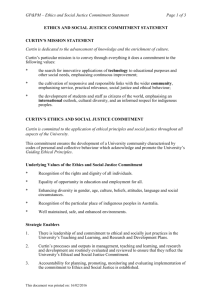Unit Coordinator Handbook - Curtin University
advertisement
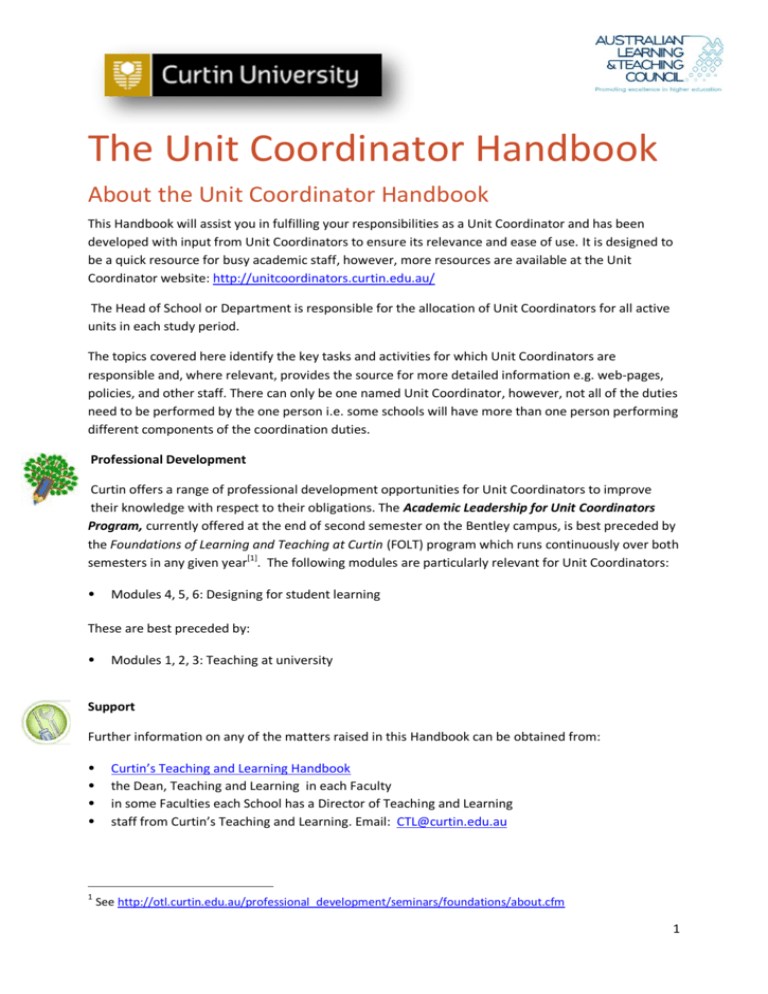
The Unit Coordinator Handbook About the Unit Coordinator Handbook This Handbook will assist you in fulfilling your responsibilities as a Unit Coordinator and has been developed with input from Unit Coordinators to ensure its relevance and ease of use. It is designed to be a quick resource for busy academic staff, however, more resources are available at the Unit Coordinator website: http://unitcoordinators.curtin.edu.au/ The Head of School or Department is responsible for the allocation of Unit Coordinators for all active units in each study period. The topics covered here identify the key tasks and activities for which Unit Coordinators are responsible and, where relevant, provides the source for more detailed information e.g. web-pages, policies, and other staff. There can only be one named Unit Coordinator, however, not all of the duties need to be performed by the one person i.e. some schools will have more than one person performing different components of the coordination duties. Professional Development Curtin offers a range of professional development opportunities for Unit Coordinators to improve their knowledge with respect to their obligations. The Academic Leadership for Unit Coordinators Program, currently offered at the end of second semester on the Bentley campus, is best preceded by the Foundations of Learning and Teaching at Curtin (FOLT) program which runs continuously over both semesters in any given year[1]. The following modules are particularly relevant for Unit Coordinators: • Modules 4, 5, 6: Designing for student learning These are best preceded by: • Modules 1, 2, 3: Teaching at university Support Further information on any of the matters raised in this Handbook can be obtained from: • • • • 1 Curtin’s Teaching and Learning Handbook the Dean, Teaching and Learning in each Faculty in some Faculties each School has a Director of Teaching and Learning staff from Curtin’s Teaching and Learning. Email: CTL@curtin.edu.au See http://otl.curtin.edu.au/professional_development/seminars/foundations/about.cfm 1 Contents The Unit Coordinator Handbook ...........................................................................................................1 About the Unit Coordinator Handbook .................................................................................................1 Key policies and proceedures for the Unit Coordinator .........................................................................3 Summary Timetable of Key Tasks ..........................................................................................................5 Timeline................................................................................................................................................5 Unit Coordinator Role Description ........................................................................................................6 The Unit Outline ................................................................................................................................. 10 Making changes to a unit outline ........................................................................................................ 10 Responsibilities ................................................................................................................................... 10 For further information:...................................................................................................................... 10 Embedding Curtin’s Graduate Attributes in Learning Activities............................................................ 11 The Teaching Team ............................................................................................................................. 12 Managing Students ............................................................................................................................. 14 Supporting Students ........................................................................................................................... 14 Referring students to learning support services .................................................................................. 14 Student equity, diversity and disability................................................................................................ 15 Counselling Services............................................................................................................................ 16 Plagiarism ........................................................................................................................................... 18 Exclusions ........................................................................................................................................... 21 Deferred assessment .......................................................................................................................... 22 Examinations ...................................................................................................................................... 22 Marks submission, missing marks ....................................................................................................... 24 Reviewing grades ................................................................................................................................ 24 Board of Examiners ............................................................................................................................. 25 Student reviews and appeals .............................................................................................................. 26 Timetables and teaching spaces .......................................................................................................... 28 Class lists ............................................................................................................................................ 29 Recognition of prior learning .............................................................................................................. 29 Improving learning and teaching (during unit delivery) ....................................................................... 31 Unit and course review ....................................................................................................................... 32 2 Key policies and proceedures for the Unit Coordinator Policies relating to Teaching and Learning (listed alphabetically) can be found at: http://policies.curtin.edu.au/policies/teachingandlearning.cfm Policies relating to Human Resources (listed alphabetically) can be found at: http://policies.curtin.edu.au/policies/humanresources.cfm Policy or procedural document (direct link) Purpose of Document Relevant Policy Webpage (if direct link has broken) Admission and Enrolment Manual (issued annually by Student Central) This manual is a consolidation of policies and procedures relating to the admission and enrolment of coursework students at Curtin University. Units Policy (see also under Policy Schedule: Schedule A –Guidelines for Units) To provide the framework for the development, nomenclature, use and deactivation of units. Assessment and Student Progression Manual This manual is a consolidation of policies and procedures relating to assessment and academic progress of students. http://policies.curtin.edu.au/policies/teachingandlearning.cfm http://policies.curtin.edu.au/policies/teachingandlearning.cfm http://policies.curtin.edu.au/policies/teachingandlearning.cfm Copyright Policy and Procedures To ensure that the University adheres to Australian legislative requirements relating to the copying, communication or performance of copyright material; and that Curtin staff and students are in a position to make legitimate use of such copyright material to assist their study, research or teaching activities. http://policies.curtin.edu.au/policies/teachingandlearning.cfm Course Approval Policy and Procedures Fieldwork Education Policy To set out the University approval process for new courses and changes to existing courses and their component majors, streams and units. http://policies.curtin.edu.au/policies/teachingandlearning.cfm To provide a framework for maximising achievement of learning outcomes and to ensure a safe and supportive environment during fieldwork education activities. http://policies.curtin.edu.au/policies/teachingandlearning.cfm Graduate Attributes Policy Outlines the graduate attributes that a student is expected to develop while studying at Curtin. http://policies.curtin.edu.au/policies/teachingandlearning.cfm 3 Plagiarism Policy and Procedures This document outlines University policy and procedures associated with the management of plagiarism in student work. This policy is to be read in conjunction with Statute No. 10 - Student Discipline and the Academic Misconduct Rules. Service Teaching Policy Student Charter To describe the development, delivery and management of service teaching. It should also assist Teaching Areas to determine when service teaching should be utilised and the responsibilities of parties involved. http://policies.curtin.edu.au/policies/teachingandlearning.cfm The Student Charter sets out the expectations and responsibilities of students and has been developed in partnership between the University and the Student Guild. http://students.curtin.edu.au/rights/student_charter.cfm Student Evaluation of Teaching and Learning Policy Textbooks Policy and Procedures http://policies.curtin.edu.au/policies/teachingandlearning.cfm This document details the manner in which the University evaluates teaching and learning through its principal system of student feedback called eVALUate, and recognises that it is one of a number of ways of evaluating teaching and learning effectiveness. http://policies.curtin.edu.au/policies/teachingandlearning.cfm To ensure pedagogical soundness, student accessibility and ethical standards are maintained in the selection and use of textbooks by academic staff. http://policies.curtin.edu.au/policies/teachingandlearning.cfm Appointment of Sessional Academic Staff Policy and Procedures To promote a consistent approach to the appointment of sessional academic staff who will support the University's vision and values of quality learning outcomes for students. http://policies.curtin.edu.au/policies/humanresources.cfm Unit Outline Policy To ensure all students are provided with essential administrative information about a unit of study and to guide them in achieving the learning outcomes for the unit. http://policies.curtin.edu.au/policies/teachingandlearning.cfm 4 Summary Timetable of Key Tasks Timeline Tasks Prepare the unit outline, including all assessment tasks and a response to eVALUate feedback from the previous relevant study periods and make available to students online (in Blackboard) Prepare the marking guides and marks weighting for all assessment tasks Induct all new teaching staff (including Sessional staff) Organise for new and sessional staff to participate in FOLT (as per policy, only Heads of Schools/Departments can give exemptions) Check and prompt Head of School regarding Service Teaching Contracts (as per Service Teaching Policy) Prior to If unit is service taught, advise Head of School regarding the existing Service Teaching Contract (as per Service Teaching Policy) the If unit is taught in other locations, ensure the ‘Branch managers/coordinators’ have all the necessary materials (including unit outline, all assessment tasks and marking guides and study criteria) Check and monitor student enrolments period Determine and manage RPL requests Liaise with the Bookshop and Library for the purchase of texts and access to reading materials Check timetabling and rooming administrators for allocated teaching spaces Load materials onto Blackboard and set up access for the teaching staff via OLAS and students Order equipment and materials, as needed Arrange for recording/release of iLectures Create student email and class lists Organise fieldwork, labs and tutorials as appropriate Complete any administrative forms, contracts etc on behalf of staff and students Check all staff are aware of eVALUate Manage and monitor student databases Attend, prepare for and contribute to School and Unit related meetings Advise peers about administration processes During Manage student deferments, appeals and other requests Ensure all staff teaching in the unit (including teaching staff at other Curtin locations) are the familiar with and apply Curtin’s assessment policy and guidelines study Ensure all staff involved in marking have copies of the relevant marking guides for each assessment task period Conduct moderation of every assessment task Ensure all markers record assessment results in Grade Centre (within Blackboard) or other format as approved by the Dean, Teaching and Learning Submit student marks at the end of the semester Participate in Annual Review process, and Comprehensive Course Review process when After relevant the Keep current with scholarship in the discipline Analyse eVALUate feedback and provide relevant feedback to your teaching team study Publish an online response to student feedback in the Unit Summary Report (USR) prior to the period next semester Acknowledgments are given to the UCaLL Project, ALTC LE824. 5 Unit Coordinator Role Description The Unit Coordinator (UC) is a pivotal role in the university. As UC, you provide the bridge between students and their learning, and the broader aims and values of the university. The UC is charged with the responsibility to facilitate the best learning experience for students, a rewarding experience for the teaching team, and compliance with relevant policies and procedures to ensure a satisfying and equitable experience for all. As UC, you will lead, motivate and inspire while ensuring that a quality learning experience for students is central to everything you do. Responsibility Tasks 1. Design teaching and learning experiences that influence, motivate and inspire students. 2. Develop and maintain unit curricula and resources that reflect a contemporary command of the field Provide leadership in unit development in conjunction with the course coordinator and the teaching team Develop unit learning outcomes which are aligned with Curtin’s graduate attributes and the course/major learning outcomes Design learning experiences for students which stimulate curiosity, engagement and independence in learning Develop students’ critical thinking skills, analytical skills and scholarly values Inspire and motivate students through high level communication, presentation and interpersonal skills to provide them with an excellent learning experience Ensure learning experiences are inclusive for students with diverse backgrounds or with a disability Ensure content is appropriate to the unit, contemporary and appropriate to the level of the student Ensure learning and teaching approaches are evidence-based Develop and present coherent and imaginative resources for student learning appropriate for the mode of study. Use contemporary literature, texts and emerging themes in the field, taking into account: a. the range of student diversity and learning styles, including students who are external, transnational and from equity groups; b. university policies; c. academic quality regulations and guidelines; d. graduate attributes; e. the context of the course/major structure and appropriate sequencing. Communicate unit learning outcomes clearly, including how assessments help students achieve these outcomes. Develop and maintain appropriate flexible learning environments for teaching and assessment within the unit (eg Blackboard) Select unit textbooks in accordance with policy and ensure bookshop library are notified in a timely fashion of resources required 6 3. Design and evaluate assessment and feedback to support student learning 4. Ensure appropriate support to meet the diverse needs of the student cohort. 5. Employ scholarly teaching practices that influence, motivate and inspire students to learn Design authentic assessment tasks that demonstrate students’ achievement of the learning outcomes Ensure assessment tasks minimise the risk of plagiarism and take into account student diversity, different contexts, university policies and academic quality regulations and guidelines Provide marking guides that define assessment and performance criteria prior to assessment being undertaken Ensure students receive timely, worthwhile feedback on their learning Use a variety of assessment and feedback strategies Ensure both formative and summative assessments are provided Ensure students receive adequate feedback on their learning Undertake moderation and review of all assessment tasks Apply university policy with respect to plagiarism and academic misconduct, applications for assessment extensions and assessment appeals Ensure examinations have been peer reviewed, are aligned with unit learning outcomes, and are prepared by required deadlines Recognise the particular learning needs of first year students and help facilitate their transition into university learning Foster student progress in the unit (particularly first year units) and monitor for signs of student disengagement/weak performance Ensure students from equity and other demographic subgroups receive adequate support to participate and facilitate success in their courses. Be available to students to: a. Provide pastoral care; b. Refer students to university and counselling support as needed; and c. provide academic advice in relation to the unit; Respond to student enquiries and provide advice on issues such as queries related to unit learning, exams, deferrals, pre-requisites, making reasonable accommodations and adjustments for students with a disability etc Acknowledge the traditional owners of the land within the unit Develop and maintain scholarly approaches to teaching, learning and assessment in order to: a. Engage, influence, inspire and motivate students to learn; b. Ensure best practice in teaching, learning and assessment c. Appropriately prepare students to achieve Curtin’s Graduate Attributes and the workforce through Curtin’s Triple-I curriculum; d. Critically evaluate teaching, learning and assessment practice 7 6. Maintain and continually improve unit quality 7. Coordinate and support and the quality of teaching and learning in the unit and ensure the teaching staff operate as a team Monitor all factors of teaching and learning for quality including: a. moderation of assessment design, standards and quality within a unit b. secure maintenance, collation and transmission of student results into unit collation sheets c. ensuring marks are submitted for all assessment items for each student d. review of the data on student performance and distribution of grades e. recommendations for supplementary and deferred assessments f. record of moderation of results and processes used Report and manage Level I cases of plagiarism and refer any suspected Level II or III plagiarism cases to authorised officers as per the Plagiarism Policy. Reflect on unit evaluation information (including eVALUate) to inform continuous improvement Initiate and implement unit improvements to enhance learning and teaching quality (in consultation with course/major coordinator) Communicate with students on unit development and changes in response to student feedback Communicate regularly with relevant Course/Major Coordinator Recruit quality sessional staff as per the Appointment of Sessional Academic Staff Policy and Procedures and the processes outlined by Human Resources Prepare tutor resources which include teaching responsibilities, access to facilities/support, contact details of relevant staff, unit outline, learning experiences, lesson plans, resources etc to ensure consistency in the learning experience Ensure all staff participate in compulsory Foundations of Learning and Teaching modules Arrange face to face or on-line teaching team planning/briefing/debriefing meetings to provide information and materials required for the Unit and to discuss assessment requirements/ moderation (prior to and during the study period) Ensure all staff have the skills and access to resources required to undertake the teaching and assessment tasks eg Blackboard, Turnitin Moderate teaching approaches and student assessments (including provision and use of marking and feedback criteria; arrangements for collection/return of assignments, submission of marks, allocation of marking amongst team members, time frames for return of assessments, procedures for dealing with plagiarism, procedures for dealing with requests for review of marks, moderation meetings) In consultation with the Course Coordinator, provide explicit instructions and guidelines for regional/transnational staff Communicate discipline and culturally specific codes of conduct that facilitate appropriate handling of student misdemeanours Mentor, coach and assist sessional staff, as needed Monitor sessional staff performance 8 8. Administrative responsibilities Collaborate with administrative staff to monitor timetabling and class registration Liaise with technical/support staff to ensure appropriate resources are available for all classes 9 The Unit Outline The unit outline is a binding document. What is learnt and assessed in units must be communicated very clearly in language which is easily understood by students who are not experts in the discipline. The Unit Outline Builder (UOB) is a system designed for the creation, revision, review, and publication of unit outlines. The UOB system extracts authoritative unit information from existing corporate applications such as Student One and enables authorised people at Curtin to produce and publish approved unit outlines. The UOB is currently being phased in across the University and responsibility for its implementation sits with each School. Making changes to a unit outline Each unit outline must be reviewed and updated for every study period in which the unit is offered by the Unit Coordinator to ensure it is accurate and current. A unit outline is an official record of the University. Changes can only be made to the official data in a unit outline by following the procedures specified in the Course Approval Process Policy and outlined at the following website (Determining Levels of Change at http://coursesmgmt.curtin.edu.au/LevelsofChange.htm) After a unit outline has been made available to students, the assessment details, criteria for successful completion of the unit, and due dates for assignments and other assessment tasks, may be altered only with the consent of the majority of the students enrolled in the unit. Consent must be documented and made available to the Head of School as required. Responsibilities A Unit Coordinator is responsible for: • establishing with their Head of School/Department that their name is correctly recorded in Student One as the named Unit Coordinator for each relevant unit in each study period; • monitoring, reviewing and revising the unit outline for each study period in which the unit is available to students; • including feedback from branch and offshore unit coordinators in the review process; • ensuring they comply with the appropriate course and unit approval policies when amending a unit outline; • liaising with their Course Coordinator and Head of School in order to: facilitating a review process for each unit they coordinate, and following the procedure (as per the policies) to gain consent and approval for any alterations to a unit once the unit has commenced in any given study period. For further information: Teaching and Learning Handbook – Chapter 4 (current version 2010) see http://otl.curtin.edu.au/teaching_learning/handbook.cfm 10 Embedding Curtin’s Graduate Attributes in Learning Activities A Unit Coordinator must ensure that students are provided with appropriate learning, teaching, and assessment experiences that will enable them to develop and demonstrate that they have achieved the unit learning outcomes that contribute to the achievement of the Course Learning Outcomes (that is, Curtin’s Graduate Attributes). Responsibilities A Unit Coordinator must ensure that: • • The unit learning outcomes are explicitly linked to the Course Learning Outcomes and the assessments, and communicated to staff and students in all unit documentation Course Learning Outcomes are embedded in learning activities and assessment tasks. For further information: • • Teaching and Learning Handbook – Chapter 4 and 5 (current version 2010) see http://otl.curtin.edu.au/teaching_learning/handbook.cfm Graduate Attributes Policy 11 The Teaching Team The Unit Coordinator has a leading role to play in ensuring that staff teaching in the unit (full-time, part time and sessional staff) understand the unit requirements, are correctly informed of their responsibilities and work collaboratively to provide a high quality learning experience to students. Usually, Unit Coordinators identify and recommend teaching staff to the Head of School. This must occur in sufficient time for sessional contracts to be prepared and signed by the authorised member of staff. Note that specific considerations may apply to off-campus staff (particularly those in offshore campuses) and/or staff working across multiple Schools, Faculties and locations. Sessional staff members are appointed, and work within, Curtin’s Human Resources Conditions of Employment. The administrative paper work associated with appointments is usually managed by School Administrative Offices. The Unit Coordinator can assist by: providing a communication gateway between the staff members concerned, the Head of School and Curtin administration; ensuring that work contracts and responsibilities are clear and accurate ensuring appropriate access to required facilities and resources including: email, telephone, office space, access and library cards and teaching materials. Unit Coordinators can support sessional teachers to contribute to improvements by encouraging: feedback on the unit and recommendations for improvement; student feedback using eVALUate (unit and teaching surveys) and other evaluation tools; professional dialogue on student feedback; and inclusion in course and unit review processes. Responsibilities The Unit Coordinator can ensure a positive learning environment is created amongst the teaching staff by ensuring that sessional staff are: • welcomed to the University and treated fairly, respectfully and professionally; • attending relevant induction, training and professional development programs including Foundations of Learning and Teaching (see Training in Tertiary Teaching For Sessional Staff policy); • supported in understanding Curtin policies and procedures; • given access to relevant employment information and that all actions have been completed to ensure required access to facilities and resources have been made available; and • included as collaborative partners to constantly improve student learning experiences and outcomes. 12 • adopting inclusive work practices to ensure that staff are invited to participate in relevant University functions and activities; • involved in the moderation process with all the members of the teaching team. A Unit Coordinator must ensure that remote, off-campus and offshore lecturers and tutors receive course and unit materials in a timely fashion, (a minimum of two weeks before StartUp week on branch campus) and communicate with them on a regular basis to ensure that the unit is delivered smoothly and comparably in each location. Although Curtin systems recognise only one unit coordinator per unit, where there are local coordinators on branch campuses or offshore locations, the main campus Unit Coordinator must consult closely with that person regarding the particular contexts and student needs for that location. Check status of the coordinators offshore as this may vary for each faculty. For further information: Human Resources Conditions of Employment (http://hr.curtin.edu.au/conditions_of_employment.cfm) Appointment of Sessional Academic Staff Policy and Procedures Frameworks for Internationalisation: this is a web-based, self-directed professional development program for Curtin staff that is currently being updated as part of an Office of Learning and Teaching (formerly, the Australian Learning and Teaching Council) project (Learning Without Borders). Especially relevant to a Unit Coordinator are the following two modules: Curtin Staff Services website see http://staff.curtin.edu.au/staffservices/index.cfm Module B: for Transnational Unit Coordinators/Team Leaders Module C: for Teachers in a Transnational classroom A number of Office of Learning and Teaching projects have developed resources that assist in managing sessional staff and clarifying the Unit Coordinator role as an academic leader, see: The Recognition, Reward and Development (RED) Resource (for sessional staff management and development) The UCall Project (a range of resources about the Unit Coordinator role including a booklet of very useful proformas). 13 Managing Students Expectations related to student behaviour are set out in the Student Charter (http://students.curtin.edu.au/rights/student_charter.cfm), which was developed in partnership by the Student Guild and the University. Students have responsibilities and are expected to: 1. Inform themselves of, and comply with, all relevant laws, University Statutes, rules, by-laws, the University’s Guiding Ethical Principles, policies and procedures relating to their rights as a student. 2. Participate constructively in the learning experience. 3. Be aware of course and unit requirements and their individual academic progress. 4. Behave in an appropriate manner within the learning environment, showing respect for both staff and fellow students at all times. 5. Use University facilities and services in an honest and responsible manner. 6. Recognise that cheating, plagiarism and fabrication or falsifi cations of data are not acceptable. 7. Embrace and recognise diversity. 8. Adhere to the proper use of copyright material. For further information: For information on classroom management visit: Teaching and Learning Handbook – Chapter 8 (current version 2010) see http://otl.curtin.edu.au/teaching_learning/handbook.cfm Supporting Students Student Wellbeing The University provides a range of services to support students, however, if you are unsure about which service can best help a student visit Student Wellbeing at: http://studentwellbeing.curtin.edu.au/ Or email: studentwellbeing@curtin.edu.au Referring students to learning support services The Learning Centre offers learning support programs for all Curtin undergraduate and postgraduate students. The Centre offers free seminar programs conducted by specialist lecturers in a relaxed, supportive environment. Face to face learning is supplemented with online resources. 14 Students who are referred by their supervisor, unit coordinator, or lecturer and attend five seminars will have access to individual assistance. Support services for students studying in offshore locations will vary according to location. Responsibilities The Unit Coordinator is responsible for: • Identifying students in need of specialist learning help and refer them to the Learning Centre. For further information: Curtin’s Learning Centre website: http://unilife.curtin.edu.au/learning_support/learning_centre.htm Student equity, diversity and disability Curtin recognises that some students require alternative arrangements for teaching and learning and assessments. This may be due to a disability, a medical condition or a religious reason. The Disability Standards for Education supports the rights of students in education, and outlines the obligations that education providers must meet to assist students with a disability. Students with a disability have the right to accessible learning and assessment activities appropriate to their needs. Learning resources should be provided in an appropriate format that does not disadvantage the student. Teaching and assessment strategies may need to be adjusted to meet the learning needs of the student. • Curtin has a Disability Access and Inclusion Plan (DAIP) that outlines how Curtin will ensure access for students with disabilities. • Equity examinations are facilitated through the University Counselling Services. Responsibilities The Unit Coordinator must ensure that: reasonable adjustments are made to learning and assessment activities to accommodate student equity and the needs of students with a disability, provided the adjustments do not compromise the academic integrity of the course, and they consult with staff from University Counselling Services and Disability Services to discuss specific issues that may arise within the unit. 15 For further information: Disability @ Curtin website see http://disability.curtin.edu.au Disability Standards for Education And Guidance Notes 2005 see http://www.deewr.gov.au/schooling/programs/pages/disabilitystandardsforeducation.aspx Curtin Student Equity website see http://unilife.curtin.edu.au/studenteq.cfm Counselling Services The Counselling Service offers a range of services to students, from academic advice to counselling to crisis assistance. They also provide support services for international students and run group workshops throughout the year. Some of the workshops offered are designed to assist staff to provide the right support for students experiencing a crisis. For further information: Student Counselling Services: http://unilife.curtin.edu.au/health_wellbeing/Students.htm 16 Assessment The Curtin University Student Charter states that every student can expect to have ‘fair assessment and timely and useful feedback on their performance and progress, including final results’. The essential information on assessment is outlined in the Assessment and Student Progression Manual . It is crucial that a Unit Coordinator understand the policy and procedures for assessment as outlined in this manual, and keep up-to-date with any revisions. Responsibilities The Unit Coordinator is responsible for: • Reviewing the assessment for the unit and ensuring that assessment tasks are aligned to the unit learning outcomes. This review should consider and make clear to students: the learning outcome(s) assessed by each assessment task; the marking criteria for each assessment; the number, type and purpose of assessment tasks and the distribution of marks for each task; the dates of all assessments scheduled in the study period (excluding assessment tasks scheduled during examination weeks); information on when they can expect their assessment tasks to be marked and/or returned; the duration of any examination(s) for the unit; details of any penalties for late submission of work (where late submission is accepted); where known, the dates of field work, clinical or practical placements and, where applicable, other special activities; the required referencing style and where guidance on complying with this referencing style can be obtained; scheduled dates for Deferred Assessment and Supplementary Assessment. For further information: The Assessment and Student Progression Manual Teaching and Learning Handbook – Chapter 5(current version 2010) see http://otl.curtin.edu.au/teaching_learning/handbook.cfm 17 Plagiarism Curtin has a plagiarism policy which supports a consistent approach to establishing the seriousness of an incident of plagiarism. It includes explicit procedures for dealing with a plagiarism incident, imposing penalties and keeping records. Students must be informed of Curtin’s policy on academic integrity, including plagiarism. Responsibilities The Unit Coordinator is responsible for: • designing assessments that minimize the risk of plagiarism; • providing students with information and guidance on academic writing and the avoidance of plagiarism appropriate to the discipline and level of study; • advising staff teaching the unit on the University's policies and procedures related to plagiarism; • identifying incidents of plagiarism and taking appropriate action as required. (Unit Coordinators are responsible for determining the outcome of Level I incidents of plagiarism, recording incidents on the Plagiarism Recording System, and providing students with appropriate remedial advice.) For further information: Teaching and Learning Handbook – Chapter 7 (current version 2010) see http://otl.curtin.edu.au/teaching_learning/handbook.cfm Student Guidelines for avoiding Plagiarism see http://academicintegrity.curtin.edu.au/global/studentbook.cfm Dealing with Student Plagiarism: Guidelines for Staff see http://academicintegrity.curtin.edu.au/global/staffbook.cfm Curtin's Academic Integrity website see http://academicintegrity.curtin.edu.au/home/ Marking and grade allocations Marking reliability can be improved in a number of ways. These include: providing a marking guide to ensure reliability (consistency) between different markers ensuring that all assignments (or one particular section of an assignment) are marked by the same marker second marking/double-blind marking of some or all assessments– small differences can be resolved by averaging, whereas larger differences should be handled through discussion involving the unit coordinator and a third marker. 18 Responsibilities The Unit Coordinator is responsible for ensuring: • moderation of assessments in accordance with Curtin policy on moderation (See the Assessment and Student Progression Manual ) the fairness and reliability of assessment tasks and related marking criteria for those tasks assessors are provided with sufficient information to ensure comparability of marking and providing clarification and/or guidance should this be required during the marking process assessment tasks are marked in such a way that the mark or grade reflects how well a student achieved the learning outcomes and in accordance with the assessment criteria markers record assessment results in GradeBook (within BlackBoard) or other formats as approved by the Dean, Teaching and Learning and returned assignments are accompanied by feedback that: a) provides clear, constructive and timely guidance to help students improve their performance on future assessment tasks b) clearly explains how the final mark was derived; assignments and/or feedback are returned to students in time for them to improve their performance on the next assessment task. • the secure collection and return of assignments (online or hardcopy), the collation of grades and recording of results. • issues are recorded as they arise during marking to ensure they are incorporated and resolved during the annual review process. Note that it is the responsibility of the Unit Coordinator to ensure that students receive feedback on their performance in assessment tasks in a timely and effective manner. Timely and effective feedback occurs when students are provided with feedback within a timeframe that will enable the student the opportunity to take action to address any deficiencies prior to completing the next related assessment task. Feedback should be aimed at supporting the student’s learning process and achievement of learning outcomes. For further information: Teaching and Learning Handbook – Chapter 4 (current version 2010) see http://otl.curtin.edu.au/teaching_learning/handbook.cfm 19 Late assessment submission Accepting late submission of assignments or other work is a matter for each Unit Coordinator and School to determine – depending on the procedures and rules adopted by their Faculty, in accordance with Section 4.1 of the Assessment and Student Progression Manual. Responsibilities Unit Coordinators should ensure that penalties for late submission must be clearly set out in the unit outline as per Section 4.1 of the Assessment and Student Progression Manual and a reference to a standard school/department approach. For further information: Refer to “Late Assessment” in Section 4.1 of the Assessment and Student Progression Manual. 20 Exclusions Refer to “Exclusion of Students from Clinical and Practical Placements” in Section 36 of the Assessment and Student Progression Manual for the correct procedures. A student may be excluded from a clinical or practical placement where it has been determined that: • • the student is a potential danger to him or herself or to the public, or urgent action to exclude the student is required due to the behaviour of the student or some other factor. These provisions should be limited to those situations where an immediate exclusion is considered necessary and the normal processes do not provide a means of resolving the matter in the timeframe required. Responsibilities • The initial determination to immediately exclude a student for up to 24 hours may be made by the Unit Coordinator, clinical or field education coordinator or equivalent member of staff. • The Unit Coordinator, clinical or field education coordinator or equivalent member of staff must immediately report the exclusion to the Head of School. The report must document the reasons and/or incidents giving rise to the decision to exclude the student. For further information: • Refer to “Exclusion of Students from Clinical and Practical Placements” in Section 36 of the Assessment and Student Progression Manual. Where relevant, contact the academic area or Curtin Fieldwork Coordinator for guidance. • Curtin offers an academic leadership program to support fieldwork coordinators (staff responsible for clinical placements, practicum and internships) although it is not offered every year. To find out whether it is running visit: http://otl.curtin.edu.au/professional_development/index.cfm • A detailed manual to support fieldwork coordinators has also been developed visit http://fieldworkeducation.curtin.edu.au/staff/teach_learn.cfm for more information. 21 Deferred assessment See Section 4.3 of the Assessment and Student Progression Manual for the correct processes for deferred assessments. Responsibilities • The Unit Coordinator should recommend approval or non-approval of the request to the Head of School and provide reasons for the recommendation. • Normally, a Deferred or Supplementary Assessment should be of the same duration and format as the original final assessment. However the Unit Coordinator may set any type of assessment provided it is consistent for all students in the same situation in the same unit. For further information: • Assessment and Student Progression Manual Examinations An examination is a formal, supervised assessment of learning outcomes which usually takes place at the conclusion of a formal teaching period. The Unit Coordinator is usually the examiner for the unit. The examiner is assisted by a co-examiner, appointed by the Head of School. Responsibilities The Unit Coordinator is responsible for: • preparing examinations (centrally scheduled examinations usually take place at the conclusion of a semester or formal teaching period and must be worth at least 30% and not usually more than 50% of the final unit mark); • ensuring that the format and content of examination papers are in accordance with the requirements of the unit outline provided to students at the beginning of the study period; • ensuring that the examination paper is delivered to the University Examinations Office by the specified deadline; • directing students who request special consideration (e.g. because of religious commitments, a disability or medical condition) to University Counselling Service to make alternative examination arrangements, if required, by the set deadline; and • ensuring, wherever possible, past examination papers are made readily available to students for revision purposes. 22 For further information: Teaching and Learning Handbook – Chapter 5 (current version 2010) see http://otl.curtin.edu.au/teaching_learning/handbook.cfm All examinations, whether Centrally Scheduled or School Scheduled, must be conducted in accordance with the Regulations for the Conduct of Examinations. Examinations held during the University Standard Examination Periods are Centrally Scheduled Examinations and will be scheduled and managed by the University Examinations Office, provided deadlines for submission of scheduling requirements and examination papers are met. All other examinations (including Open Universities Australia at Curtin examinations) are School Scheduled Examinations. Responsibilities The Unit Coordinator is normally the examiner for the unit and is responsible for: • the format and content of examination papers in accordance with the policy of the subject committee as set out in the unit outline provided to students at the beginning of the study period; • ensuring that the examination paper is hand-delivered to the University Examinations Office by the specified deadline; • ensuring that a different examination paper is written when the difference between the commencement times of two examinations (i.e. in different locations) exceeds the duration of the examination itself. Time zone differences (if any) must be taken into account when determining the commencement times of the examinations; • determining the grades and marks for students in a unit, in consultation with the co-examiner, and entering these on the result sheet. All grades and marks should be consistent with the University Grading System. For further information: • Assessment and Student Progression Manual 23 Marks submission, missing marks Students must be assigned a grade for each assessment in the unit according to the grading schema and marking criteria indicated in the unit outline. There must be sufficient feedback provided to defend the grade that has been given. Responsibilities • The Unit Coordinator is responsible for collating assessment results for the unit and ensuring that the marks are accurately recorded in Student One. • The Unit Coordinator must keep accurate records of all assessment results (and any feedback provided to students) in case the student wishes to question the mark or the result is appealed. For further information: • University Grading System see http://examinations.curtin.edu.au/students/grading.cfm Reviewing grades Responsibilities The Unit Coordinator is responsible for the review of results. This review may comprise any of a number of available methods, such as: • spot checking a random or selected sample of student work to check for consistent application of marking criteria and standards; • second marking a random or selected sample of student work to compare marks awarded; • second marking student work deemed to be at a borderline (pass/fail or between grade boundaries); • grading marks if required to maintain a degree of comparability in the interpretation of grades across units; • analysing results to see if there is any potential variance between markers. For further information: • Assessment and Student Progression Manual 24 Board of Examiners A Board of Examiners is a committee that is constituted for each award course to ensure that the assessment and determination of performance for each student enrolled in that course are conducted in a fair and equitable manner. The Board of Examiners is responsible for: • • • • • • • ratification of final results; determination of each student’s academic status at the end of each study period; approving or noting the approval of Deferred Assessment by the Head of School and notifying relevant Schools of all Deferred Assessment decisions; approving Supplementary Assessment and notifying relevant Schools of all Supplementary Assessment decisions; approving Conceded Passes; determining Awards with Distinction; determining an Award with Honours and the level of honours. Responsibilities • The Unit Coordinator is normally a member of the Board of Examiners, and is expected to participate on the Board as required by University policy. • Students placed on Conditional status by the Board must be provided with appropriate support and assistance. This may include a requirement to meet with the Unit Coordinator or other staff member or to attend counselling or undertake remedial studies. For further information: • Assessment and Student Progression Manual 25 Student reviews and appeals Any student who feels the mark awarded for an assessment task is unfair or incorrect should in the first instance raise their concern with the appropriate member of staff (lecturer or staff member responsible for marking the work). Depending on the circumstances, the student may also need to raise the matter with the Unit Coordinator. The Unit Coordinator must take care to ensure that all procedures, as per Assessment and Student Progression Manual are followed carefully. Responsibilities • Where it seems warranted, the lecturer or Unit Coordinator will arrange for the work to be remarked and the student notified. For further information: • Assessment and Student Progression Manual 26 Unit learning resources The unit outline will specify the type of learning activities utilised, the tuition pattern (i.e. lectures, tutorials, workshops, seminars and/or online learning activities) and the unit learning resources. The Unit Coordinator is responsible for ensuring textbooks and other learning resources are readily available for students. Please note the policy on textbooks. Responsibilities The Unit Coordinator must discuss the relevant unit learning resources with their Faculty librarian (see http://library.curtin.edu.au/about_us/corporate/staff/fac_staff.html), and be familiar with Library/bookshop policies and procedures to ensure that: • the recommended textbook (if required) is available in the bookshop (a 3 to 4 month lead time may be required, so the text should be ordered in plenty of time); and • recommended textbooks and other readings are available in e-reserve/closed reserve. The Unit Coordinator must also ensure that: any learning resources that are specified in the unit outline (for example, equipment) are readily available by providing clear instructions to students on how to access them; and all learning resources provided for the unit adhere to Australian legislative requirements relating to the copying, communication or performance of copyright material; they adhere to the Selection and Use of Textbooks Protocol ; if they are the author of a textbook, that they have adhered to the Conflict of Interest Policy . For further information: • • • • • Selection and Use of Textbooks Protocol see http://policies.curtin.edu.au/policies/az_index.cfm#T Curtin University Library see http://library.curtin.edu.au/ Guidelines for adding items to eReserve see http://library.curtin.edu.au/find_information/catalogue/ereserve_guidelines.html Curtin University Bookshop see http://www.bookshop.curtin.edu.au/ Copyright at Curtin see http://copyright.curtin.edu.au/ Teaching and Learning Handbook – Chapter 10 (current version 2010) see http://otl.curtin.edu.au/teaching_learning/handbook.cfm 27 Administrative tasks Unit Coordinators should be familiar with the key policies relevant to administration listed on page three of this Handbook. be familiar with the following: Timetables and teaching spaces The Unit Coordinator is responsible for scheduling classes and booking venues for all teaching and learning activities in conjunction with the relevant School staff (e.g. administrator, course coordinator). For activities related to classes/units please email the Class Management Office (classes@curtin.edu.au) with your request. Curtin staff accessing centrally allocated teaching spaces can log in and create their booking requests online by visiting http://roombookings.curtin.edu.au/staff.cfm. The web room booking system is for ad-hoc bookings only (eg. meetings) and is not a tool for scheduling teaching activities. Other procedures may apply where access to locally managed facilities is required particularly in offshore locations. Special timetabling and rooming considerations may apply where a unit is taught across a number of courses, or if access to audiovisual and/or other teaching aids are required. All staff are encouraged to make optimal use of Curtin's iLectures for recording lectures and making them available to students online. For support to achieve this visit: Curtin Teaching and Learning Responsibilities The Unit Coordinator is responsible for: • liaising with the Course Coordinator with respect to the scheduling of teaching and learning activities; • requesting centrally allocated teaching spaces through the Class Management Office and book teaching spaces for other relevant learning and assessment activities; • liaising with administrative staff to ensure that the venue is appropriate to the learning and/or assessment activity; and • advising lecturers and tutors associated with the unit of their respective space allocations. 28 For further information: Availabilities and Timetabling Unit see http://atu.curtin.edu.au/ Online Venue Booking Request - centrally allocated teaching space see http://properties.curtin.edu.au/roles/am/space/venues/forms/ Curtin iLectures see http://ilectures.curtin.edu.au/information/ Class lists Whilst it is the responsibility of students to ensure that they are correctly enrolled in a unit, the Unit Coordinator should also check enrolment records for the unit. Responsibilities The Unit Coordinator is responsible for: • providing lecturers and tutors with access to the class list at the commencement of the unit; and • reminding lecturers and tutors to check the class list and advise students to amend their enrolment accordingly when an anomaly is noticed. For further information: • Curtin’s Admission and Enrolment Manual - 2009 Recognition of prior learning Recognition of Prior Learning (RPL) may be granted to students: • • on the basis of prior studies; and/or on the basis of prior professional (work) or life experience. The authority to approve RPL in all courses, both undergraduate and postgraduate, rests with the relevant Pro Vice Chancellor. However, the Pro Vice Chancellor may delegate authority to approve RPL to designated staff within the Faculty, and it is normal for the designated officer within the Faculty to seek advice from the Unit Coordinator when assessing an RPL application. Responsibilities The Unit Coordinator is responsible for: 29 • providing advice to the Faculty on the assessment of Recognition of Prior Learning applications. For further information: • Student Central website see http://students.curtin.edu.au/administration/enrolment/index.cfm 30 Improving learning and teaching (during unit delivery) eVALUate – student feedback mechanisms Curtin is committed to monitoring and improving the quality of learning and teaching through systematic unit and teaching evaluation, interpretation, responding to student feedback, publication of results and benchmarking. Unit Coordinators play a key role in using the feedback to improve units by reading reports, reflecting on student feedback and working with other staff teaching in the unit to improve the student experience. eVALUate is Curtin’s online system for gathering and reporting students’ perceptions about their learning experiences. Students can give feedback about units and teaching through the eVALUate unit survey and the eVALUate teaching survey. The eVALUate unit survey is automatically available for all coursework units and the eVALUate teaching survey is available for all teaching staff on request (teachers are required to register online (see http://evaluate.curtin.edu.au/info/). Responsibilities The Unit Coordinator should: • promote and educate students and teaching staff about eVALUate to encourage students to give feedback on the unit and on teachers; • reflect on the student feedback and share the results with other staff teaching in the accordance with the Full Unit Report guidelines; • inform students as to how feedback has been used to maintain or improve the quality of learning experiences by communicating with students, adding a response to the Unit Summary Report online and including a statement in the unit outline . • monitor the quality of a unit using student feedback from eVALUate reports and other sources (e.g. focus groups) and benchmarking with other units; and • use feedback to identify opportunities for recognising excellence and identifying areas for improvement. For further information: • • Curtin’s eVALUate website see https://evaluate.curtin.edu.au/ Teaching and Learning Handbook – Chapter 11 (current version 2010) see http://otl.curtin.edu.au/teaching_learning/handbook.cfm 31 Unit and course review Units should be reviewed annually to ensure that they reflect good teaching and learning practice. They will also be reviewed as part of the comprehensive course review process, usually every 5 years The annual review is convened by the Unit Coordinator, who may invite comment from colleagues within the institution or those external to it whereas the comprehensive course review process is convened by a Course Coordinator. Responsibilities A review would typically ensure that teaching and learning activities are: • aligned with the unit learning outcomes; • consistent with the scope and level of the unit; • clearly and unambiguously described in terms of the task and assessment criteria; • equivalent when offered in multiple locations; • designed to avoid the inadvertent encouragement of plagiarism; • appropriately weighted and scheduled across the study period. • negotiated with the Course Coordinators who are responsible for the course/s where that unit is taught For further information: • Teaching and Learning Handbook • Assessment and Student Progression Manual • Course Coordinator Role Statement 32
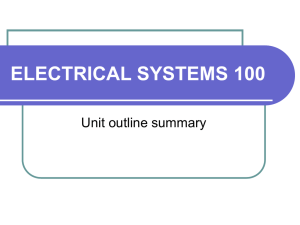
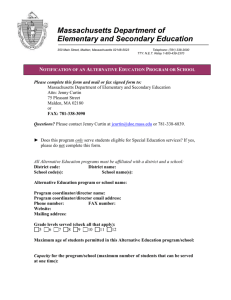
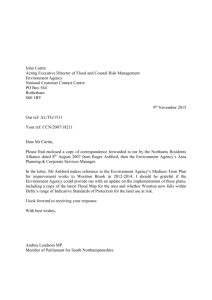

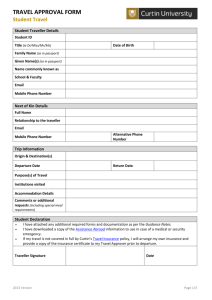
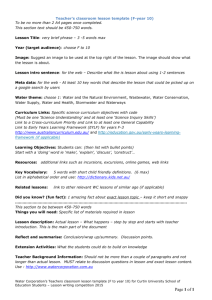
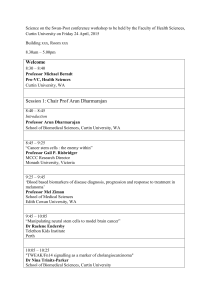
![e-Reserve for academics: your required reading solution [ 226KB]](http://s3.studylib.net/store/data/008170839_1-092998fcf76d73737fa8128d01c357b4-300x300.png)
